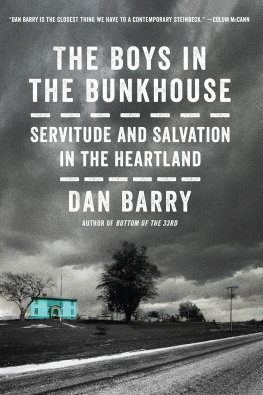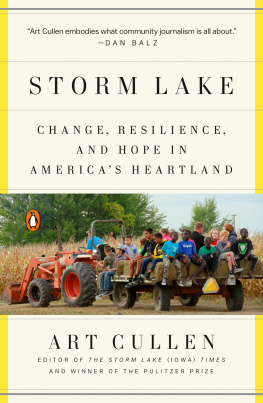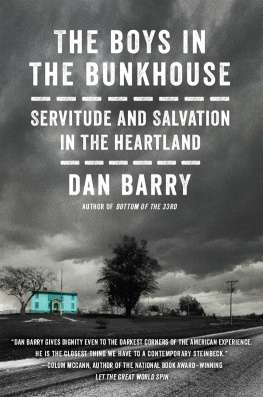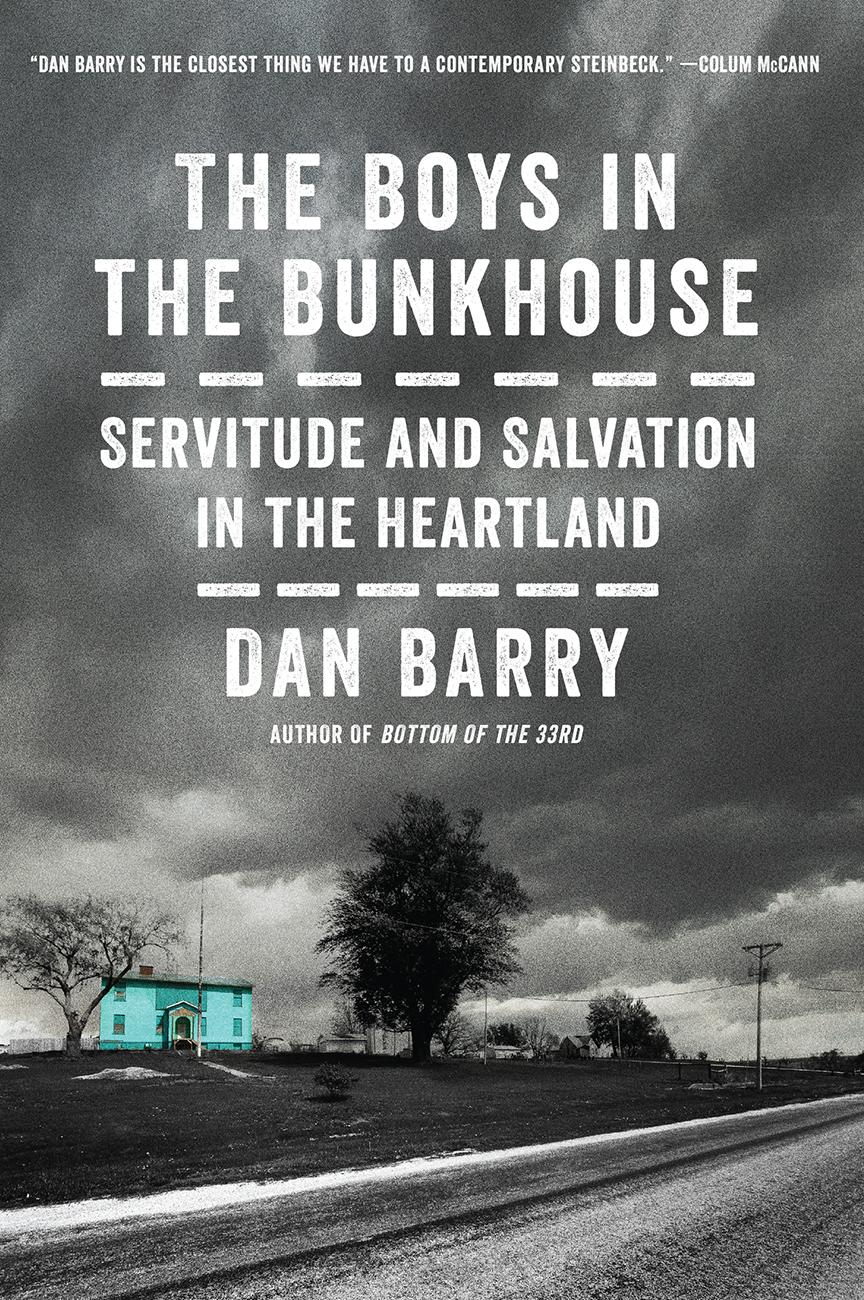TO THESE MEN
For, while the tale of how we suffer, and how we are delighted, and how we may triumph is never new, it always must be heard. There isnt any other tale to tell, its the only light weve got in all this darkness.
JAMES BALDWIN
CONTENTS
Guide
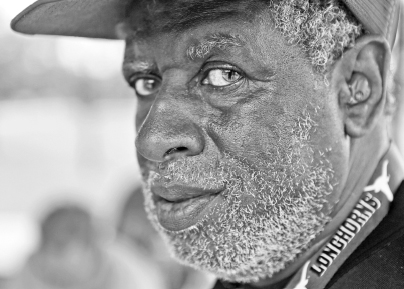
Willie Levi
F IRST THING, GET THEM BIRDS out the coop.
When the truck sighs to a stop in the turkey plants feather-flecked dock, its time to unload. You open a crate and grab a forty-pound turkey that wasnt too happy about being caged in the first place but sure as hell doesnt want to leave it now. He knows. He aint stupid. He can tattoo you black and blue just by beating his wings, or pop you right in the balls, so grab him by the legs, tuck him under an arm, and flip him. Then hang that birdhang im!upside down on one of them shackles moving toward the plants mouth. Watch him get swallowed up.
Willie Levi did this hundreds, thousands of times a day, for years, for decades, turning the shit-flutter task into an artistic performance of movement and sound, like some Astaire of slaughter. He was the turkey whisperer. He talked to the birds, and they talked back, as if sharing an interspecies understanding about the fetters of fate.
I go, he says, and makes the face of just having swallowed an egg whole. He puffs out his cheeks and summons his turkey song from somewhere deep within, a haunting aria unrelated to the gobble-gobble of childs play. Guttural and true and anxious and mournful, Willies song carries an insight earned from having spent nearly as much time with turkeys as with humans, on scratch-dirt ranches, in henhouses and tom pens, on the loading docks, along the assembly lines of evisceration, in Texas, Iowa, Missouri, South Carolina, his clothes flaked with their guts and fingernails caked with their blood. His shelter, his food, his paltry earningshis every joy and sorrowwere controlled by a company whose very name invokes the damn bird that dictates his life: Henrys Turkey Service.
And they talk right back to me, he says. I go... And they go...
But Levi did more than talk to these panicked creatures. He eased them into an acceptance that their time had come, comforting them in their final moments like an adult child whispering to a shrunken parent in a rented hospice bed that its all right, its all right, you can let go.
I pat em on the belly when I get em on the shackle, he says. I say, Okay, okay, Tom, quieten down.
Okay, Tom, okay. Quieten down. Let go, little bird, let go.
Get them out the coop, Levi says. Send them to the kill room.
T IME FOR WILLIE LEVI IS either today, or not.
Today he might remove the two plastic white spoons he keeps tucked into one of his socks pulled high and beat out a clickety-clackety rhythm. He might tell you he prefers being called Levi; just Levi. He might get depressed, and fall quiet. Or he might sing one of those hymns he came to know so well as a robed member of the Sunshine Singers, a traveling choir at the Mexia State School. He remembers all them songs, he says: What a Friend We Have in Jesus; Hes Got the Whole World in His Hands; The Old Rugged Cross.
So Ill cherish the old rugged cross
Til my trophies at last I lay down
I will cling to the old rugged cross
And exchange it someday for a crown
Today is today, and one day closer to his favorite day of the year, his birthday, which he will tell you whether it is the day before, the day after, or Christmas, his wandering left eye measuring your reaction to the news.
August 19, 1946, is the thick, muggy day that Willie Levi is born in the eastern Texas city of Orange. His father is a millworker, when he works. His mother is a hotel maid who knows from the moment she holds her first child that he is mentally deficient, as a state report would later put it. If there is a normal to his family, to his time, he did not act it.
What has transpired from that blessed day until today is the time-contracted past for Levi: a jumble of many moments, any one of which could have happened a half year ago or a half century ago. But today is today, and what a friend we have in Jesus.
He grows up in a shotgun house a few hundred yards from an old burial site for slaves. People are always coming and going in that ramshackle home, a sister named Idabelle, a brother named Joseph, a cousin called Toot-Toot, a nephew called Hookie. Theres Oscar, and Theresa, and Shirley Mae, and Pookie, who once ate mud, and Willie Levi cannot tell you the last time he saw any of them.
His mother, Rosalie, works at the swanky Jack Tar Orange House Hotel down by the Sabine River, where white people stay when they visit this city of sawmills, shipyards, and oil. The hotels postcards say Prepare to be Pampered, and Rosalie does her part, making the beds, scrubbing down the bathrooms. But Ernest, his father, pretty much drinks beer for a living. Drinks so much Schlitz that one of Levis chores is to rouse his daddy with buckets of cold water to the face.
I ask my daddy, Are you mad I woke you up? Levi says. And he say, You did the right thing waking me up, so I wont be late for work.
Doctors advise Levis mother that her firstborn should be placed in an institution, but she chooses not to hear all the fancy words that come down to separating mother from child. So Levi goes to school with all the other poor black children in that part of Orange. He has a teacher named Miss Odom, and she is very nice, and she lives with her two daughters in a yellow house that he likes to visit and say trick or treat on Halloween. But he has another teacher who once hit him with a razor strap for putting tacks on the instructors chair, and who knows what mischief maker planted that thought in Levis head. Before long, he is taking the short walk to the Emma H. Wallace School, a looming, tan-brick building formerly known as the Orange Colored School. But in the language of officialdom, his education remains limited.
Out of school, Levi is working at a doughnut factory, boxing them babies up. And then hes at the squat brick train station in Orange, wearing a dark suit and earning tips by helping older people with their luggage. When the conductor shouts his farewell song, Levi lustfully joins in:
All aboar-r-r-d!
Willie Levi is now a man-boy of nineteen. His soaked father is nowhere to be found, and his worried, overworked mother is in Rusk State Hospital for the mentally ill. An aunt named Miss Louise depends on welfare for food and she just cant take care of the boy anymore. So, one hot June morning, Levi and his sister, Idabelle, take a long bus ride with lots of station stopsthey get fried chicken at one of them! Finally, they reach some far-off Texas place that boasts of being a great destination no matter how you pronounce it. But you pronounce it Meh-HAY-ya, almost like a greeting called out on the street.
Mexia, Levi.
They visit a campus with a sprawl of buildings, just outside town. It is a special school with the feel of a military encampment, for good reason, but the people are nice and everything is fine. Then Idabelle explains that she has to go, but he has to stay. She says she doesnt want to leave, but she has to. And he has to stay.
Levi tells Idabelle that he wants to go back to Orange. It is a plea he will make many, many times in the decades to come, as he is taken to places much farther from Orange than Mexia, places out of his home state of Texas entirely, places devoted to turkeys.

